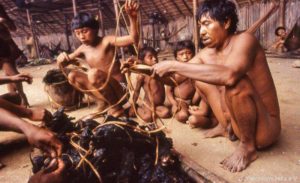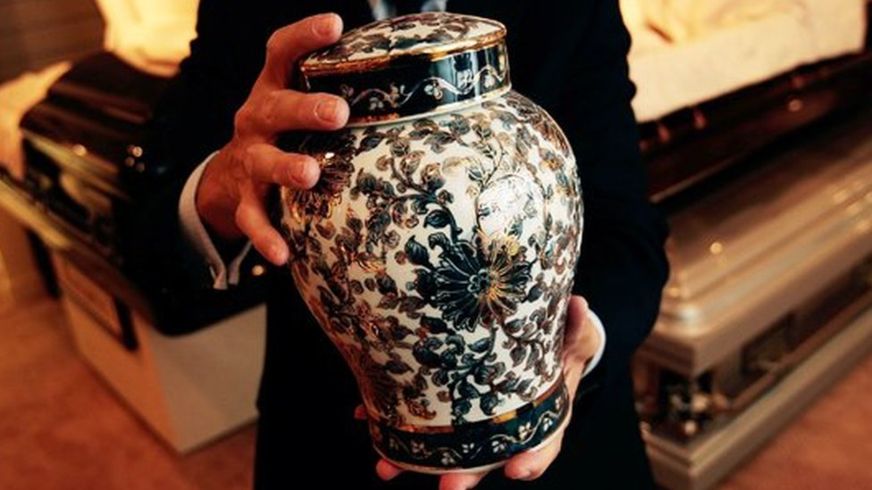
Is cooking an art? This question is something to be pondered on because how can a basic skill that everyone should have be considered an art? I am arguing that the creation of new recipes should be considered an art because the taste is a sense that we too often take for granted. If you think about how can one calculate the perfect amount of spices, seasonings, and herbs to make a delicious dish? This combining of different ingredients takes skill and some people are better at it than others. Creativity is utilized by chefs to make the best-tasting dishes. Furthermore, in the course that I am taking, “The Cultural Lives of Art and Crime,” I remember reading about an artist who utilized cooking in one of his pieces by building a kitchen set. He made free food for his audience while they were able to enjoy one another’s company.
If we were to claim that cooking in and of itself is an art then what if we were to add human flesh to the cooking recipe? If it weren’t for it being illegal, then it could possibly be argued that it’s an art. It surprised me to find out that there are no federal laws in US against cannibalism. However, most of the laws enacted by states, make it legally impossible to obtain and consume body matter. To begin with, murder is illegal and even with someone’s consent, it still classifies as murder… which is a crime. There have been psychotic mass murderers such as Jeffrey Dahmer who would consume his victims. Luckily, this person was caught and punished for their horrible actions.
Furthermore, it’s also possible to obtain human body parts through purchasing them. Despite the National Organ Transplant Act of 1984 prohibiting the buying and selling of organs for transplantation; it is found that the laws on organs for research and education aren’t very strict. This was learned about in 2017 which is crazy to think that this was only six years ago.
Now that we have discussed the legality side of things then how is this involved with a culture? In South America there is a tribe which consumes other human beings. They are known as the Yanomami tribe and they are found in Venezuela and parts of Brazil. Their burial process is known as endocannibalism. This basically means that they practice cannibalism within their own community. They eat the flesh once people have passed because they believe that soul needs to be protected after the body dies. They also believe that consuming a part of the deceased includes always having a piece of them within. They believe that completing this ritual is the only way the soul can attain eternal peace.
This tribe is fascinating because of the fact they have not been influenced by modernization or western society. It’s interesting to note that if they were to hypothetically migrate to US, their actions would be considered illegal; unless they’re recognized as an autonomous tribe. This brings up multiple questions such as those that follow: Who are we to tell them that they are unable to follow their culture anymore? Wouldn’t that be an obstruction of their right?








Manny, this is such a fascinating article as cannibalism usually tends to be an exotic topic of conversation. To start, I agree with your claim that the casual art of cooking is in it of itself, not a form of art, but of necessity. However, when someone begins to get creative with food, mixing new ingredients or testing out new strategies, it becomes one of life’s most fun art forms, in my personal opinion. Circling back to cannibalism and its connection to crime in the US, I find it really interesting that other cultures in the world not only accept this process, but believe it is a proper transition to the afterlife and a form of respect.
I think that, with respect to cannibalism as a rite in rituals and spiritual practices, the Western world has it all wrong. We tend to demonize that which is unfamiliar, and to us, the idea of eating another human is perverse and wrong. I can easily admit that I’ve never wanted to eat another human, but despite that, I can look past my prejudices and see the merit in the Yanomami’s practices. It reminds me of a social media post I saw where a man had to amputate his leg, and to celebrate, he and his friends turned his leg into tacos and held a dinner party. With the Yanomami, there is a spiritual aspect that I believe justifies the practice and even makes it palatable to a Westerner. I can appreciate how endocannibalism allows a circular pattern to life, wherein it is given by the community and reabsorbed into that community. I wonder, if the world had not been so thoroughly colonized, what variety of burial methods might occur? Would the United States still bury its dead, or would we, too, eat ours?
This was a really interesting read. It is always fascinating to me to hear about tribes that are not as well known and to see how they life their lives. That being said, I really appreciate Manny, the author of this article, for writing this article with care as it did not come off as shaming their culture or shaming their cannibalism. I understand that from our point of view, cannibalism is just a terrible act to think about and it makes us wonder — how can they do this? How do they not see anything wrong with it? But this is the culture of the Yanomami Tribe and I have to say that this is nor a cultural crime or a form of art. What I assume this is, is a part of their ‘funeral’ process/customs and it should be respected. Yes, there are diseases that can be caught due to cannibalism but if this tribe is still standing, then they have most likely grown immune to it or they know how to correctly prep these meats without getting sick.
This is a very interesting and controversial article. I think before arguing whether cannibalism is a form of crime art or not, we should educate the Yanomami tribe about the bad and deadly impacts that can cabalism have on their health and life span. Cannibalism is been shown to lead to terminal and deadly diseases that are contagious and can persist for a long time and be transmitted to many generations in tribes like these. In my opinion, we should respect people’s rituals and beliefs, but cannibalism should be treated more as a cultural crime despite that this practice does not hold bad intentions. Both modernized (e.g. offenders devouring their victims to hide their crime) and ritualized types of cannibalism should be made illegal to prevent the direct or indirect harm that can be brought to humans.
This is a very interesting and controversial topic. I think before arguing whether cabalism is a form of crime art or not, we should educate the Yanomami tribe about the bad and deadly impacts that can cabalism have on their health and life span. Canbilism is been shown to lead to terminal and deadly diseases that are contagious and can persist for a long time and be transmitted to many generations in tribes like these. In my opinion, we should respect people’s rituals and beliefs, but cabalism should be treated more as a cultural crime despite that this practice does not hold bad intentions. Both modernized (e.g offenders devouring their victims to hide their crime) and ritualized types of cannibalism should be made illegal to prevent the direct or indirect harm that can be brought to humans.
There is a piece of writing called “On the Cannibals” by Montaigne and he describes how a civilization was seen as “barbaric” by European colonizers because their customs involved cannibalistic rituals. Montaigne address the argument about how each group saw something “barbaric” about the other whether it was cannibalism or European torture tactics. I think that we shouldn’t be so quick to judge and ridicule a tribe’s ritualistic practices without questioning modern society’s own violent customs.
If the Yanomami Tribe hypothetically moved to the U.S., the U.S. culture would tell them that cannibalism is wrong. Their beliefs may or may not change. Prion disease is one of the major problems of cannibalism for which there is no cure. Yes, everyone is entitled to their beliefs, but some behaviors are acceptable and not acceptable in the U.S., more than just culturally but for health and the detriment of their tribe.
The idea of cooking humans as an art form brings up the role of culture in law-making. Some acts legal in some places are illegal in other places such as with the legalization of marijuana or gun control. The varying laws in different states means there is no consistency in laws across states. Consistency is difficult to obtain since cultural implications and considerations have to be made. Beliefs largely influence culture which ultimately impacts one’s behaviors and actions. This raises the question of how to implement utilitarian laws for a better society while still honoring and respecting each culture’s background. Is this even possible?
I think if the Yanomami Tribe hypothetically moved to the U.S., the U.S. culture would tell them that cannibalism is wrong. Their beliefs may or may not change. Prion disease is one of the major problems of cannibalism for which there is no cure. Yes, everyone is entitled to their beliefs, but there are behaviors that are acceptable and not acceptable in the U.S., more than just culturally but for health and the detriment of their tribe.
Hey Manny,
What a refreshing article after reading a million other ones about AI, social justice, and body image. I think that cooking is absolutely an art form, and I liked the approach that you took to that. I think art is creative and cultural, it also can be a statement if done correctly. that being said I’m not sure that cannibalism is a cooking art form crime, but more probably a cultural crime, since there are cultures that consider it in rituals. Such as eating someone to release their soul or gain their power. Undeniably from that side of things art and crime.